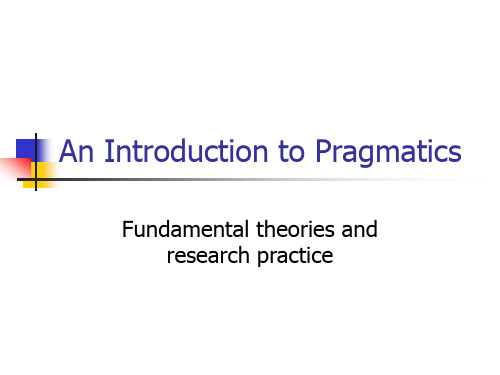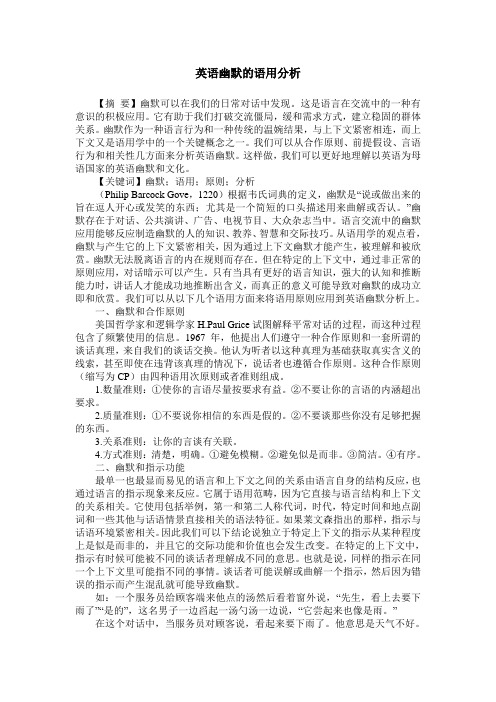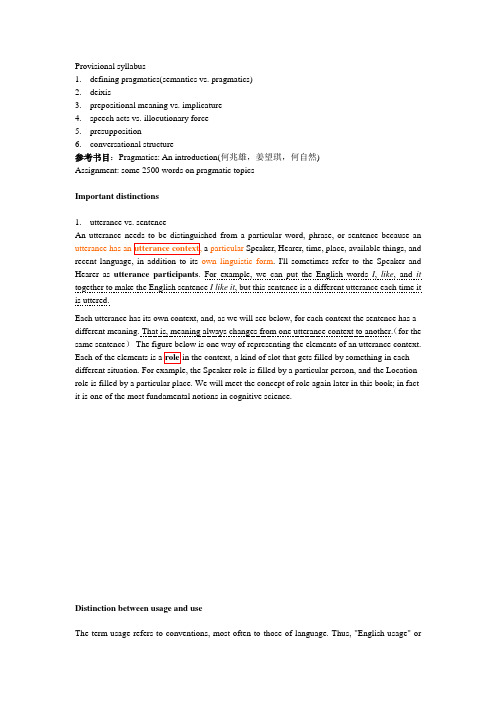pragmatics:an introduction
Chapter One An Introduction to Pragmatics

Chapter Eleven Critical discourse analysis
Chapter Twelve Pragmatic transfer in intercultural communication
Grice suggested that pragmatics should centre on the more practical dimension of meaning, namely the conversational meaning which was later formulated in a variety of ways (Levinson, 1983; Leech, 1983).
The Anglo-American VS Continental tradition of pragmatic study
The Anglo-American tradition of pragmatic study focuses on how language users express and interpret communicative intention.
The development of pragmatics owes much to the heated dispute over Chomsky’s view of language.
Chomsky believes that people are born to have the LAD.
Many linguists are against Chomsky’s practice of ignoring the social and contextual factors in language use.
英语人称指示语分析

文化长廊英语人称指示语分析陈富强 辽宁大学外国语学院摘 要:随着我国对外开放的推进,越来越多的中国人开始学习和使用英语以达到与外国人交流沟通的目的。
受到中英不同文化的影响,英语指示语和汉语指示语并不完全相同,如果用汉语思维理解英语指示语,就容易产生误会、影响交流。
本文搜集了一些日常生活中的话语作为语料,分别分析了英语第一、第二、第三指示语的实际含义,为学习英语的中国人了解并正确使用英语指示语提供了理论帮助。
关键词:指示语;汉语思维作者简介:陈富强(1995-),男,山西太原人,辽宁大学外国语学院外国语言学及应用语言学专业研究生。
[中图分类号]:H313 [文献标识码]:A[文章编号]:1002-2139(2018)-09-174-011、引言人称指示语是指示语的重要组成部分。
人称指示语是对出现在言语活动中的交际双方及言语活动谈及的其他角色的符号指称。
人称指示语可以分为三种类别:第一、第二、第三人称指示语。
对于人称指示语的研究通常局限于语法层面,主要研究人称指示语的指示意义。
实际上,人称指示语是用于特定语境中表达意义的,它不仅表达指示意义还表达社交意义。
不同语境下的人称指示语并不相同。
本文将分析不同语境下的英语人称指示语的意义,对英语学习者理解并使用英语人称指示语提供帮助。
2、英语第一人称指示语在英语中,第一人称可以分为第一人称单数指示语“I”和第一人称复数指示语“we”。
人们常常利用第一人称单数指示语“I”表达自己的看法和态度,体现了说话者对该观点正确性的信心以及说话者愿意承担话语后果的责任,增强了话语的说服力。
在第一人称复数指示语“we”的使用中,一般有四种情况。
第一种,“we”既包括说话者又包括听话者,在这种情况下,说话者将他与听话者放到同一个立场上,缩短了他与听话者的心理距离。
这种“we”常常使用在说话者为听话者提出建议或请求的语境中;第二种,“we”不包含说话者,这种用法可以弱化说话语气,从而使听话者更容易接受说话者的想法,所以常常用于祈使句当中,如We can’t do this again, Tom,这是Tom的母亲劝诫Tom不要再做某事时使用的,这句话中的we指代Tom, 说话者用we代替you缩短了会话双方Tom和母亲的心理距离,使Tom 更容易接受母亲的劝告;第三种,“we”不包含听话者,说话者在使用这种“we”时可以体现他的权威与社会地位;第四种,“we”常在第一人称指示语的位置上,显示出说话者将观点的提出归功于团队的共同努力,使说话者的观点听起来更加客观,更可信赖,而且显现了说话者谦虚的态度,从而使说话者的观点与想法更容易被接受。
语用学第一章

• Definition 2: • Pragmatics is the study of all those aspects of meaning not captured in a semantic theory. • 语用学是对所有那些未能纳入语意理论 的意义侧面的研究。
• Definition 3: • Pragmatics is the study of the relations between language and context that are basic to an account of language understanding. • 语用学是对语言和语用之间对于说明语 言理解来说是十分根本的那些关系的研 究。
Component vs. perspective分相论与 综观论
• • Component view of pragmatics Davis points out in his book Pragmatics: A Reader(1991) that pragmatics, like phonetics, phonology, morphology, syntax and semantics, is a component of linguistics. • Perspective view of pragmatics Verschueren(1999) proposes that pragmatics is not a component of linguistics, but a new way of looking at language. Pragmatics is specified as “a general cognitive, social, and cultural perspective on linguistic phenomena in relation to their usage in forms of behavior”(Verschueren,1999) 语用学是语言各个方面的功能总览, 即研究人类生活中语言的 认知、社会和文化的功能。
英语语言学硕士研究生必读书目

英语语言学硕士研究生必读书目1. Cook, V.and Newson, M. Chomsky’s Universal Grammar: An Introduction.外语教学与研究出版,20002. Radford,A. Syntactic theory and the structure ofEnglish.London:CUP,19973. Quirk, et al. A Comprehensive Grammar of the English Language.Longman,1985.4. 胡壮麟. 语言学教程. 北京: 北京大学出版社, 2001.5. 何兆熊. 新编语用学概要. 上海:上海外语教育出版社, 2000。
.6. Halliday, M.A.K. An Introduction to Functional Grammar. Beijing: Foreign Language Teaching and Research Press, 2002.7. Mey, J.L. Pragmatics: An Introduction. Beijing: Foreign Language Teaching and Research Press, 2001.8. Austin, J.L. How to Do Things with Words. Beijing: Foreign Language Teaching and Research Press, 2002.9. de Saussure, F. 1983. Course in General Linguistics. London: Duckworth.10.Quirk, R et al, 1985. A Comprehensive Grammar of the English Language. London/New York: Longman.11.Joseph, G. MLA Handbook for Writers of Research Papers(5th edition). Shanghai: Shanghai Foreign Language Education Press, 2001.12.朱刚:《二十世纪西方文艺批评理论》(英文),上海外语教育出版社,2001;13.刘炳善:《英国文学简史》(英文),郑州:河南人民出版社;14.常耀信:《美国文学简史》(英文),天津:南开大学出版社;15.文学方向必读期刊:Critical Inquiry, published by the University of Chicago; New Literary History, published by the Johns Hopkins University Press; Comparative Literature, published by University of Oregon;《外国文学评论》、《外国文学研究》、《外国文学》、《国外文学》、《当代外国文学》或其他与外国文学相关的核心期刊。
普通语言学 8-Pragmatics讲解

5. 为什么研究语用学?
Humpty Dumpty:
“When I use a word, it means just what I choose it to mean -neither more nor less.”
英美语用学: 语用学的成分论 (component view of pragmatics)
欧陆语用学: 语用学的综观论 (perspective view of pragmatics)
英美语用学
语用学是语言理论的核心组成部分,与语 音学、音位学、形态学、句法学、语义学 的地位相同。
语用学研究的是依赖于语言使用的意义。
Carnap (1942):order of degree of abstractness: syntax is the most and pragmatics is the least abstract, with semantics lying somewhere in between. Syntax provides input to semantics, which provides input to pragmatics.
主要研究:含意、预设、言语行为、指示 语
欧陆语用学
语用学为语言行为的各个方面提供一个功 能的视角或综观。
语用学在总体上被看作是语言交际的理论。
包括社会语言学、心里语言学、语篇分析 所涵盖的领域。
欧陆语用学
更加接近Morris(1938)的语用学思想
Jacob Mey (1993):
1. Micropragmatics: context, implicature and reference; pragmatic principles; speech acts; conversation analysis
语用学Pragmatics An Introduction

1
Chapter 1:Defining Pragmatics
Preliminaries Pragmatics: definition and delimitation What use is pragmatics?
2
Preliminaries
15
Dynamic communication perspective: Pragmatics is the study of the expression of relative distance. (Yule, 1996:3) Pragmatics is the study of the ability of language users to pair sentences with the contexts in which they would be appropriate. (Levinson, 1983:24)
11
The complementarity by Leech
Semanticism (pragmatics inside semantics) Pragmaticism (semantics inside pragmatics) Complementarism (complementary but independent)
12
Definitions
Speaker’s perspective: Pragmatics is the study of speaker meaning. (George Yule, 1996:3) Pragmatics is the study of how people use language for successful communication. (Kempson, 1977:84)
英语幽默的语用分析

英语幽默的语用分析【摘要】幽默可以在我们的日常对话中发现。
这是语言在交流中的一种有意识的积极应用。
它有助于我们打破交流僵局,缓和需求方式,建立稳固的群体关系。
幽默作为一种语言行为和一种传统的温婉结果,与上下文紧密相连,而上下文又是语用学中的一个关键概念之一。
我们可以从合作原则、前提假设、言语行为和相关性几方面来分析英语幽默。
这样做,我们可以更好地理解以英语为母语国家的英语幽默和文化。
【关键词】幽默;语用;原则;分析(Philip Barcock Gove,1220)根据韦氏词典的定义,幽默是“说或做出来的旨在逗人开心或发笑的东西;尤其是一个简短的口头描述用来曲解或否认。
”幽默存在于对话、公共演讲、广告、电视节目、大众杂志当中。
语言交流中的幽默应用能够反应制造幽默的人的知识、教养、智慧和交际技巧。
从语用学的观点看,幽默与产生它的上下文紧密相关,因为通过上下文幽默才能产生,被理解和被欣赏。
幽默无法脱离语言的内在规则而存在。
但在特定的上下文中,通过非正常的原则应用,对话暗示可以产生。
只有当具有更好的语言知识,强大的认知和推断能力时,讲话人才能成功地推断出含义,而真正的意义可能导致对幽默的成功立即和欣赏。
我们可以从以下几个语用方面来将语用原则应用到英语幽默分析上。
一、幽默和合作原则美国哲学家和逻辑学家H.Paul Grice试图解释平常对话的过程,而这种过程包含了频繁使用的信息。
1967年,他提出人们遵守一种合作原则和一套所谓的谈话真理,来自我们的谈话交换。
他认为听者以这种真理为基础获取真实含义的线索,甚至即使在违背该真理的情况下,说话者也遵循合作原则。
这种合作原则(缩写为CP)由四种语用次原则或者准则组成。
1.数量准则:①使你的言语尽量按要求有益。
②不要让你的言语的内涵超出要求。
2.质量准则:①不要说你相信的东西是假的。
②不要谈那些你没有足够把握的东西。
3.关系准则:让你的言谈有关联。
4.方式准则:清楚,明确。
第一堂课笔记

Provisional syllabus1.defining pragmatics(semantics vs. pragmatics)2.deixis3.prepositional meaning vs. implicature4.speech acts vs. illocutionary force5.presupposition6.conversational structure参考书目:Pragmatics: An introduction(何兆雄,姜望琪,何自然)Assignment: some 2500 words on pragmatic topicsImportant distinctions1.utterance vs. sentenceAn utterance from a particular word, phrase, or sentence because ana particular Speaker, Hearer, time, place, available things, and recent language, in addition to its own linguistic form. I'll sometimes refer to the Speaker and Hearer as utterance participants. For example, we can put the English words I, like, and it together to make the English sentence I like it, but this sentence is a different utterance each time it is uttered.Each utterance has its own context, and, as we will see below, for each context the sentence has a different meaning. That is, meaning always changes from one utterance context to another.(for the same sentence)The figure below is one way of representing the elements of an utterance context.different situation. For example, the Speaker role is filled by a particular person, and the Location role is filled by a particular place. We will meet the concept of role again later in this book; in fact it is one of the most fundamental notions in cognitive science.Distinction between usage and useThe term usage refers to conventions, most often to those of language. Thus, "English usage" or"French usage" refers to the conventions of those languages, respectively. When we refer to "word usage," we mean the conventions for using words; when we refer to "use of words," we mean only the employment of words: "This text describes the principles of word usage." "He is noted for his frequent use of wrong words."Usage: the way that words are used in a language:the way in which something id used, or the amount of it that is used 词语的使用,东西抽象、归纳的使用:car usage has increased dramatically.(使用方法,用量) a book on modern English usage关于现代英语用法的书Use:1 when people use something to do something: Are you in favor of the use of animals for research?2. A purpose for which something can be used the drug has many uses.3.If you have the use of something, you are able to use it or someone has allowed you to use it运用能力;使用权:Joe's given me the use of his office.Robin LakoffFrom Wikipedia, the free encyclopediaRobin Tolmach Lakoff (born 1942) is a professor of linguistics at the University of California, Berkeley. Lakoff's writings have become the basis for much research on the subject of women's language. In a 1975 article, she published ten basic assumptions about what she felt constituted a special women's language. Much of what Lakoff proposed agreed with theories originally proposed in the 1920s by Otto Jespersen in Growth and Structure of the English Language (1905, revised and republished several times).Lakoff's most famous work, Language and Woman's Place, introduced to the field of sociolinguistics many ideas about women's language that are now commonplace. She proposed (Language and Woman's Place) that women's speech can be distinguished from that of men in a number of ways, including:1.Hedges: Phrases like "sort of," "kind of," "it seems like"2.Empty adjectives: divine, adorable, gorgeous, etc3.(Super-)Polite forms: "Would you mind…" "Is it o.k if…?" "…if it’s not too much to ask"4.Apologize more: "I'm sorry, but I think that…"5.Speak less frequently6.Avoid coarse language or expletives7.Tag questions: "You don't mind eating this, do you?". Subsequent research has cast somedoubt on this proposition8.Hyper-correct grammar and pronunciation: Use of prestige grammar and clear articulation9.Indirect requests: "Wow I'm so thirsty." – really asking for a drink10.Speak in italics: Use tone to emphasis certain words, e.g., "so", "very", "quite".Lakoff also developed the 'Politeness Principle', in which she devised three maxims that are usually followed in interaction. These are: Don't impose, give the receiver options and make the receiver feel good. She stated that these are paramount in good interaction. By not adhering to these maxims, a speaker is said to be 'flouting the maxims'.。
- 1、下载文档前请自行甄别文档内容的完整性,平台不提供额外的编辑、内容补充、找答案等附加服务。
- 2、"仅部分预览"的文档,不可在线预览部分如存在完整性等问题,可反馈申请退款(可完整预览的文档不适用该条件!)。
- 3、如文档侵犯您的权益,请联系客服反馈,我们会尽快为您处理(人工客服工作时间:9:00-18:30)。
• Leech "Interpreting an utterance is ultimately a matter of guesswork,or hypothesis formation" • Thomas "in conversational interaction, people work on the assumption that a certain set of rules is in opration, unless they receive indications to the contrary"
•
•
Conclusion
The context determines both what one can say and what one cannot say; only the pragmatics of the situation can give meaning to one’s words.
conveal implicature concerns the way we understand an utterance in conversation in accordance with what we expect to hear. • To know what people mean, you have to interpret what they say • "CP"Principle : 1 the maxim of quatity 2 the maxim of quality • 3 the maxim of relation 4 the maxim of manner
Chapter 3
Context, implicature and reference
Contents
1 context
2
Implicature
3
Reference and anaphora
context
• Context is dynamic It is to be understood as the continually changing surroundings; enable the participants in the communication process to interact in which the linguistic expressions of their interaction become intelligible. • Two views: “grammatical” context: the linguistic elements are described in isolation The presence of food in the mouth while speaking using pronouns, proper names, articles and so on e.g. John is a policeman. 机房的窗台上很乱。 • “user-oriented” context: how these linguistic elements are used in the context of interaction. 9” MAXIMUM LOOP ‘Allow [the towel] to hang a maximum of 9 inches’ (in Spanish)
context • Context is action
Context is about understanding what things are for; what gives our utterances their true pragmatics meaning and allows them to be counted as true pragmatic acts. e.g. It’s a long time since we visited your mother. 她还没有来。 我想跟你去。 Your boy’s… different. ( Forrest Gump ) --Is there a Mr. Gump, Mrs. Gump? --He’s on vacation.
• implication defines a logical relationship between two propositions.
• • • •
p: you clean the ketchen room q: I will take you out to dinner p implies q,logically, non p does not imply non q logic and everyday life do not always look at things the same way.
欢迎会? 追悼会?
毕老师: 老哥, 毕老师 老哥 那花都是什么 颜色的? 颜色的 爷爷: 白的黄的都有啊, 爷爷: 白的黄的都有啊, 可 漂亮了, 真的, 漂亮了, 真的,老百姓都拿 着笔等着, 等着都哭啦, 着笔等着, 等着都哭啦, 等 你呢! 你呢!
"implicature"
• 1 "implicature" is derived from the verb "to imply" to fold something into something else. • 2 Conversational implicature: something which is implied in conversation,that is ,something which is left implicit in actual language use
implications and implicatures
• "Implicature" is an alternative to "implication," which has additional meanings in logic and informal language.[citation needed]
implication versus implicature
• implication: 1, a possible effect or result of an action or a decision • 2, something that is suggested or indirectly stated • 3, the fact of being involved,or of involving sb in sth,escepially a crime
在上述对话中, 珍妮同样违反了数量准则, 她没有使自 己所说的话达到交谈的现时目的所要求的详尽程度。珍 妮想告诉阿甘他就是孩子的父亲, 可是她没有直说,而 是间接地表达了自己的意思。观众可以很清楚地理解其 中的会话含义,但是阿甘的智商决定了他没能理解其中 真意而是继续询问, 这种对于会话含义的不解风情毫无 疑问会使了解真相的观众感到好笑。
context • Context and convention
vs. Specific paradox of pragmatics social conventional, linguistic means express individual intentions
general paradox of language natural the desire to communicate the need to express themselves
• 这是阿甘和巴布到越南参加越战, 刚到战地时丹 中尉和巴布的对话。巴布天生厚嘴唇,丹中尉对 这一点并非不了解,但他用取笑的口吻说“最好 把你的嘴唇收起来,否则会拖到地雷上”。这无 疑是一种夸张的说法,违反了合作原则中的质量 准则,说了自己认为是不真实的话。这种对于质 量准则的违反产生了幽默效果, 同时让观众从会 话含义中了解到越南有很多的地雷,不小心就会 一命呜呼。
Case Analysis
• • • • • Forrest: You’re a momma,Jenny. Jenny: I’m a momma. His name is Forrest. Forrest: Like me. Jenny: I named him after his Daddy. Forrest: He got a daddy named Forrest,too?
• Register
one’s attitude towards their interlocutors formal vs. informal 您好! 你好! / 您请坐。 坐吧
context • Context and convention
Meaning can be natural, but language is conventional. There is no immediate, natural connection between a word and what expressed.
• Further, if we add the qualification "— not necessarily in that order" to the original sentence, then the implicature is cancelled even though the meaning of the original sentence is not altered.
• Comparison:
linguistic meaning non-natural sentence meaning purely conventional within rules of grammar and context vs. general paradox of language natural the desire to communicate the need to express themselves
